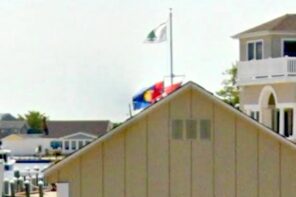Kampala, Uganda — As the car carrying American evangelist Lou Engle gained distance from the stage, exiting the grass sports field for the airport, the revival meeting organized by Engle’s The Call kicked into high gear in support of Uganda’s anti-homosexuality bill.
“The bill will be passed into law without any debate,” boomed James Nsaba Buturo, Uganda’s Minister for Ethics and Integrity, and a well-known backer of the bill, drawing cheers from the audience while Engle’s vehicle was still in view.
“We must tell the whole world that Uganda will not accept that nonsense that says homosexuality is a human right,” Buturo added to the crowd of several hundred people. “It is an abomination.”
Though Buturo’s remarks are an unsurprising representation of sentiments in Uganda’s evangelical community, there was doubt whether this event would see them laid out so explicitly. In the days leading up to the prayer rally on Sunday May 2 in Kampala, Engle (who has led US prayer rallies calling for spiritual warfare against “Antichrist legislation” such as same-sex marriage) defended himself and his organization TheCall against criticism by gay rights groups in the United States and Uganda. Critics accused Engle’s event of being the next in a series of American evangelical efforts to persecute homosexuals in Uganda and feared that Sunday’s gathering would help rally attendees behind the proposed legislation.
The Anti-Homosexuality Bill of 2009, introduced last October by parliamentarian David Bahati, had its origins in a March 2009 visit by three anti-gay American evangelists—Scott Lively, Caleb Lee Brundidge, and Don Schmierer—who gave a series of talks and workshops about fighting the “homosexual agenda” and protecting children from being “recruited” to homosexuality. The activists later denied playing a role in the bill’s creation. As documented by Jeff Sharlet, Bahati, who made an appearance at The Call on Sunday, also had strong links to The Family, the powerful network of evangelical elites embedded in the Washington DC political culture.
In its current form, the bill prescribes the death penalty for “aggravated homosexuality,” which includes homosexual actions with a minor or while knowingly carrying HIV. The bill also requires jail time for anyone (including friends, family, doctors, and clergy) who fails to report homosexual activity to the authorities.
Homosexuality has never been legal in Uganda, but the existing law is seldom enforced, as it requires offenders to be caught during sexual acts. Despite a few high-profile arrests, the Ugandan police have openly said they have other, higher priorities. Nevertheless, anti-gay public sentiments run high, and religious leaders routinely condemn homosexuality in a country where over 90% of the population describes itself as religious.
Responding to criticism that Sunday’s The Call Uganda would push the bill and incite further violence and hatred against homosexuals in Uganda, Engle issued a press statement on April 28th professing a lack of previous knowledge about Bahati’s bill and pledging a message of love to those “struggling” with homosexuality. “We do not see the character of Christ reflected in some key aspects of the language of the current bill,” the statement says, “therefore The Call, though continuing to be held in Uganda, will not promote this bill.”
Despite Engle’s pledge, though, he was sandwiched between two speakers who openly supported the bill.
On Sunday, The Call began slowly on the main sports field at Makerere University—big enough for a grass track and full-sized soccer pitch—with, perhaps ironically, a stunning view of Uganda’s largest mosque on a nearby hill. Only about 100 people had gathered by the appointed starting time of 2:00 p.m., but many more, the audience was told, would be coming from their earlier church services at their regular parishes. Far from the stage, but clearly in view, several vendors set up meat-roasting stands in anticipation of a crowd that might not fully embrace The Call’s advertised proclamation, “Prayer, fasting, and repentance changes nations!”
In what amounted to a warm-up prayer, the early arrivals were exhorted to start reaching out to the Lord, and to move around the field to start the spirit flowing within them. Engle, who is seldom still, led the way, pacing back and forth on the grass in front of the raised stage. As dark clouds loomed and a light rain began to sprinkle, worshipers were also urged to pray for the rain to clear. It did, after a scare for the unprotected sound system.
Though Engle moved continuously, he was outmatched in physical vigor by Ugandan attendee Dan Egesa who could be seen pumping his hand to the sky, bowing rapidly and forcefully throwing his arms up from a variety of standing and kneeling positions. Approached during a stationary moment, a beaming Egesa said he heard about The Call Uganda on a Christian TV station and at his church, and that he was excited to see Engle, the guest of honor. “I’ve watched some of his teachings, they are great teachings,” Egesa said.
With the threat of rain lifted, the sermons began in earnest, with popular Ugandan pastor John Mulinde of World Trumpet Mission acting as master of ceremonies in tandem with Deo Musoke, another popular pastor. “We are not here for any hidden agenda,” Musoke said at least three times, in what seemed to be an attempt to preempt criticism of the event. “We are here for the Lord, to pray and repent for the nation of Uganda.” The entire event was simultaneously translated into Luganda, the most common local language in Kampala.
For the first two hours of The Call, homosexuality was mentioned frequently, but in passing, often in a list of sins (including witchcraft, child sacrifice, corruption, and terrorism) that worshipers should pray for or confess to. Shortly after 4 p.m., however, prayers began for Bahati’s bill to be passed.
“We call on parliament not to debate heaven. We call on them to pass the bill and say no to homosexuality,” preached Julius Oyet, a pastor with Life Line Ministries in Uganda who titles himself Apostle. Oyet also brought up the common Ugandan perception that homosexuality is an import of the West which “recruits” new members primarily by bribing children. “Father, our children today are being deceived by the West. To buy them, to give them school fees so that they can be homosexuals. We say no to that,” Oyet said with a rolling voice as a live band played smooth jazz in the background.
When Engle himself finally took the microphone at about 5 p.m., he dug almost immediately into the controversy, saying he hadn’t known about the bill and nearly canceled his trip over questions raised by his presence. But at no point did he contest Oyet’s support for the bill.
“We know that Uganda has been under tremendous pressure—the church. We felt that same pressure. But I felt like The Call was to come and join with the church of Uganda to encourage you that in the nation who are showing courage to take a stand for righteousness in the earth,” Engle said.
Since arriving, Engle went on, he had consulted with Uganda’s pastors, who are “dealing with a controversy they never wanted.” He then pivoted to the blame-the-West assertion so popular among the bill’s Ugandan supporters. “What I found out was that NGOs, the UN, and UNICEF were coming in and promoting an agenda that the church of Uganda did not want to be in this nation.”
Engle was careful never to explicitly call for the passage of the bill itself, and to avoid being accused of inciting violence. “We are not standing with violence or hatred to people with homosexual lifestyles,” he preached. Still, as he does in the United States, he insisted that homosexuality harms society: “We are trying to restrain an agenda that is going to hurt the nation and hurt families.”
In addition to homosexuality, Engle preached against abortion and child sacrifice and repeatedly praised Uganda for its piety. “I think that Uganda is beyond the U.S. in their stand for righteousness,” Engle commented to reporters in a brief exchange on the way from the stage to his car, stipulating that he didn’t mean the anti-gay bill. He also said he’d felt “massive pressure” from gay rights groups in the United States.
As Engle was seeking distance from the bill from his car, Buturo took the stage for his speech unequivocally supportive of the bill.
Asked on Monday if there was an advance plan to have Engle in his car or departed by the time Buturo gave his speech, Joanna Watson, coordinator of The Call Uganda, said she had not been aware Buturo would speak and that the order of events was handled by John Mulinde, the event’s host and his organization, World Trumpet Mission. Mulinde could not be reached for comment.
Even before Buturo’s speech, several Ugandan gay rights activists who watched the event from a back row of seats said they were disappointed with Engle and The Call. “They tried to avoid the issue of inciting violence but they did not come out and condemn the bill, which was in their [press] statement,” said Dennis Wamala, who works with a group called Icebreakers Uganda. “They did not come out in any way to say this bill is wrong.”
After Buturo’s fiery speech, the event drew to a close with another symbolic prayer for supporters of the bill. Buturo and the bill’s author David Bahati were joined on the stage by their wives and the gathered pastors encircled the four in a laying of hands during which the audience was implored to pray for them.
Robert, another activist who asked that his last name be withheld for safety, said that while he is concerned about attacks against gays, all of the prayers to pass the bill and to change homosexuals struck him as humorous.
“I am proud of being here, because as they pray I am also praying,” he said. “So we are waiting to see who God will answer.”




